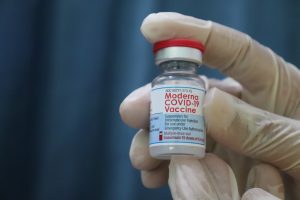Moderna is upping the ante on its mRNA vaccine slate by adding two programs aimed at tackling respiratory diseases and human coronaviruses.
The first, a combination respiratory candidate, will tackle the three most prominent viruses known to trigger respiratory diseases in adults: influenza, respiratory syncytial virus (RSV), and SARS-CoV-2. Known as mRNA-1230, this triple shot would be administered as a once-a-year booster. The other, a four-pronged dose designed to combat human coronaviruses, is dubbed mRNA-1287; it includes HCoV-229E, HCoV-NL63, HCoV-OC43, and HCoV-HKU1, which cause 10% to 30% of upper respiratory tract infections in adults. The viruses are known for bringing about the common cold, which can have life-threatening consequences for vulnerable populations such as the elderly, infants, and immunocompromised individuals.
The endgame is to mount a strong defense against the worldwide issue of illness and death from respiratory infection, according to Dr. Stephen Hoge, Moderna’s President. At some point in the future, protection from a broad spectrum of viruses may be available in a single yearly shot.
Briefing on the new programs come shortly after Moderna’s announcement of its second clinical trial gauging the efficacy of an mRNA vaccine for HIV prevention. The initial trial, put in motion at the beginning of the year, had explored a different mRNA vaccine candidate for the same indication.























